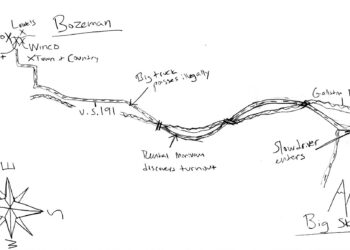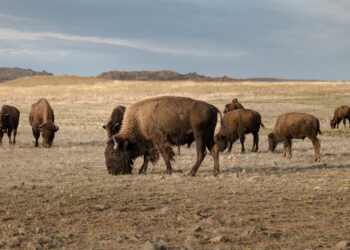By Miriam Schmidt GUEST COLUMNIST

A few months ago, I was asked to help facilitate a circle for grieving the death and celebrating the life of a person who helped teach Holistic Emotional First Aid tools to many who are currently part of Be Well Big Sky’s Navigator Network. “Shakti” Shannon had come to Big Sky to facilitate an intensive weekend-long HEFA training in the fall of 2022 and again in 2023, but by March of 2024 she had suddenly died, incurable disease having assaulted her body.
Some members of our community had known her for years. Others had simply met her for a weekend workshop. Yet she was a force of a human—an organizer, teacher, activist, and healer—and her death was felt profoundly. So we gathered with candles and objects that reminded us of her. We gathered to sing and make art and share memories. We gathered to remember and to grieve.
This gathering—along with other memorials, funerals, scatterings of ashes, and celebrations of life that I have helped facilitate over my 16 years as an ordained pastor, chaplain and spiritual leader—was one communal response to loss and grief.
If I’ve learned anything over my years of listening to people’s stories, it’s that you don’t have to look far for suffering. Every single one of us faces loss throughout life—we lose beloved family and friends, but also homes, jobs, physical abilities, health, pets, financial security and fertility. Every single one of us at some point is hit with grief—that acute and sometimes long-term pain following a loss that affects our mental health. What many of us don’t know is how to actively move toward healing, how to intentionally grieve in the face of grief.
Perhaps the first step—as is the case with many things—is awareness. People are walking around all the time weighed down by grief but without being able to name their experience. No wonder. The emotions of grief are complicated, including not just sadness, but regret, guilt, apathy, rage and even relief. These emotions can manifest in our bodies—as nausea, headaches, upset stomach or insomnia—and in our behaviors—including difficulty with focus or decision making, and confusion. Kubler Ross’s classic 1969 book, The Five Stages of Grief, states that denial, anger, bargaining, depression and acceptance are often part of the grieving process, but these stages are rarely linear. To complicate things even more, grief can be anticipatory, before the loss has actually happened; delayed, surfacing months or years after a loss; cumulative, the combination of multiple losses; or collective, loss shared by a community or even a nation.
But once you recognize that a recent death, life-changing accident, miscarriage or pandemic has caused you grief, you can start the work of grieving. Not that there is one right way. But be warned: Grieving, as my godmother Elaine Ramshaw says, is like a 20-hour-per-week job, requiring more energy than you can imagine. Grieving, for you, may involve doing less than you usually do, so that you have more time to feel what your body and spirit need to feel. Grieving, for you, may look like making space for more quiet, meditation, prayer, long walks, weeping or letting yourself yell your heart out in the wilderness. Grieving, for you, may require intentionally reaching out to connect with specific friends or family members; finding a counselor or grief therapist; joining a grief support group—learn more about the current grief group opportunity in Big Sky through Wellness in Action; attending religious services; making time for a spiritual retreat; decreasing your alcohol or drug intake; and learning to be more gentle with yourself. Again, there is no one right way to grieve. But suppressing and ignoring the reality of grief is generally not the best way forward toward hope and healing.
Of course, communal, spiritual rituals around death are yet another way we grieve. When members of the Big Sky community gathered to grieve and celebrate “Shakti” Shannon, we were able to honor each others’ emotions and witness to Shannon’s powerful memory. Grief rituals abound throughout time and space: Some communities wash and lay out the bodies of their dead in their homes; some families make a pilgrimage to significant places and spread ashes of their loved one in each spot; some pray an ancient prayer every day for eleven months.
In public memorial services or celebrations of life, we try to speak the truth about our love for the one who has been lost, and acknowledge the pain that comes from loving and losing. In such rituals, we grope together for healing, sometimes looking to God or a higher power to help us on the hard and holy journey that is grief. The ancient Psalm 30:5 reads, “weeping spends the night, but joy comes in the morning.” Grief may keep us weeping in the night, but as we actively grieve—with the help of our communities and through ancient and modern practices—we hope for a day that dawns with joy.
The Rev. Miriam Schmidt has served since 2016 as the Pastor/Priest at All Saints in Big Sky, a shared ministry of the Episcopal and Lutheran (ELCA) churches at Big Sky Chapel. She is also a Navigator with Be Well Big Sky and a member of the Spiritual Health Team at Bozeman Health and the Big Sky Medical Center. She loves Nordic skiing, backpacking, reading, and sharing meals with family and friends.














